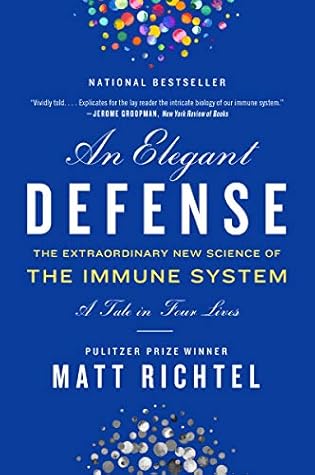More on this book
Community
Kindle Notes & Highlights
by
Matt Richtel
Read between
August 29 - August 31, 2020
molecules and invading microbes. The immune system’s policing job gets complicated by the porous nature of our bodies’ borders. Just about every organism that wants to get inside us can do so. Our body is a take-all-comers bash, a festival with open seating, coursing with every life-form that happens by—petty thieves and gangs; terrorists armed with nuclear suitcases; dumb drunk cousins and relatives; enemy agents cloaked as friends; and foes so unpredictable and alien that they seem as if beamed from another universe.
The immune system is one of the world’s most complex organic systems, equaled perhaps only by the human brain, with its origins long preceding the evolution of our species.
This is why the immune system, all things being equal, is designed foremost to keep the peace. Excessive force ends badly.
Or if you prefer a different metaphor, the body has randomly made hundreds of millions of different keys, or antibodies. Each fits a lock that is located on a pathogen. Many of these antibodies are combined such that they are alien genetic material—at least to us—and their locks will never surface in the human body. Some may not exist in the entire universe. Our bodies have come stocked with keys to the rarest and even unimaginable locks, forms of evil the world has not yet seen, but someday might. In anticipation of threat from the unfathomable, our defenses evolved as infinity machines.
I can sense readers’ puzzled looks, an eyebrow raised over your book or gadget. Haven’t you already read in this book that some other cell or substance is the first line of defense? Yes, you are correct to raise an eyebrow. You are not missing something. The thing is, the immune system has multiple overlapping, sometimes redundant first lines of defense, and second lines too. This festival—our take-all-comers cocktail party—is nothing if not chaotic and multifaceted. There also is method to the madness. Multiple actors roam the party, using different tactics, often overlapping.
At a core level, we have created a mismatch between our immune system—one of the longest surviving and most refined balancing acts in the world—and our environment. Thanks to all the powerful learning we’ve done as a species, our immune system isn’t getting the regular interaction with germs that helped to teach and hone it—that “trained” it. It doesn’t encounter as many bugs when we are babies. This is not just because our homes are cleaner, but also because our families are smaller (fewer older kids to bring home the germs), our foods and water cleaner, our milk sterilized, and on and on.
...more
Mazmanian described the upshot to me in fairly stark terms. “There are entire cell types in the body that don’t exist because the DNA doesn’t have all the information to tell that cell to develop,” he said. It’s not just Treg cells, but natural killer cells and other killer immune cells that appear to be triggered by the bacteria.
Sleep problems predict death. People who experience prolonged sleep disturbance are more likely to die, and to die earlier, than people who don’t. “The effect sizes are comparable to other known risk factors, like being sedentary, being overweight, having depression,” said Dr. Irwin.
Dr. Brunvand offered up his response. “I watched the moon landing in 1969, and it was a similar sense of awe,” he said. “It was with that same sense that we’d crossed a threshold. “I’d just seen the power of the immune system.”


